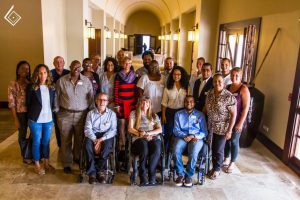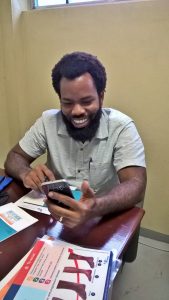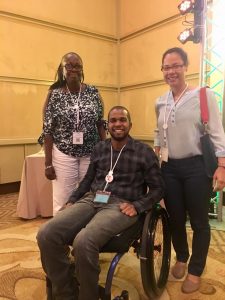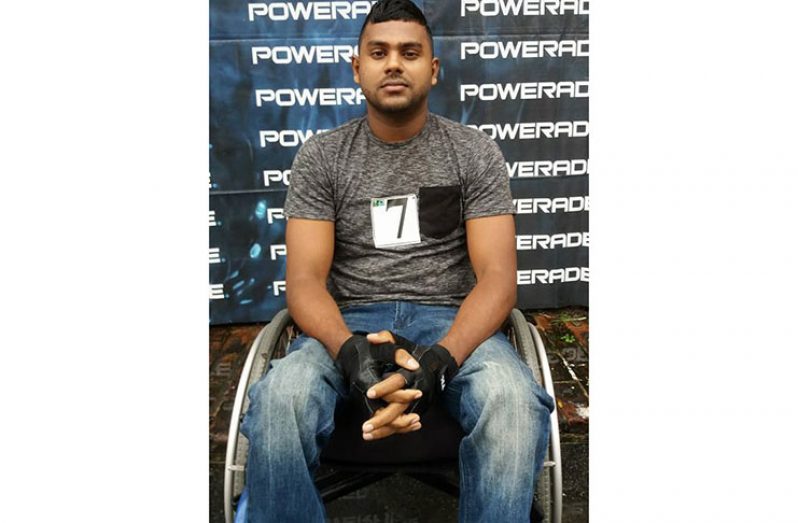By Telesha Ramnarine
AS Guyana continues to step up its efforts to look into the issues associated with persons living with spinal cord injuries (SCI), authorities are now saying that SCI must be looked at as a chronic disease and should be given the same amount of advocacy and prominence as other diseases.

The Ministry of Public Health, through its Rehabilitation Department, does not yet have a database on how many persons in Guyana are suffering from the disease, and because the advocacy level is so low, authorities are not even sure if those persons know that a variety of life-changing services are available to them, free of cost!
Not too long ago, the ‘Rehab’ Department located in the compound of the Palms Geriatric Home on Brickdam, picked up the scourge and has been making every effort to better understand SCI and reach out to survivors.
In fact, a few weeks ago, three health officers attended, for the first time ever, the third SCI Congress in Curacao, with the aim of exchanging ideas and information and fostering a collaborative effort to provide a more inclusive society for those who are suffering from the ailment.
In an interview with the Pepperpot Magazine, at the Physiotherapy Department of the Georgetown Public Hospital Corporation (GPHC), Physiotherapist Jana Edghill, one of the persons who attended the Congress, disclosed that during a pre-congress workshop, discussions were held with representatives of other countries about forming a Caribbean network for SCI, and using that network as a platform for discussing challenges being faced.
Edghill, along with Dr. Victor Allen who also attended the forum, believes that with the formation of such a network, SCI advocacy in Guyana will improve.
“A good point that came up at the Congress is that we have to start treating SCI as a chronic disease because it can happen at any time. We’re working hard to build this network because we really want to get on board. We have to work together to get that support to give these patients the care that they deserve,” Edghill expressed.
In the meantime, she is of the view that the ‘Rehab’ Department is doing a good job with the resources that it currently has available to it.

One of the main challenges that have been identified, Edghill said, is the patients’ accessibility to services, especially those from the far-flung regions of Guyana, who are forced to deal with poverty and woeful transportation services. “That has hindered them from receiving the care that they need. We have to bridge that gap. The care is there, and the human resources are there; it’s just to have that access, that pathway to accessing the services,” she posited.
While more equipment might be needed so that services can be expanded, Edghill offered that the general public ought to get on board with simple things like ramps, elevators, and lifts that can aid SCI patients in going about the activities of daily living, such as going to the bank, school, the supermarket, or even to move about on pavements and use public transportation.
SOCIETY’S VIEW OF SCI SURVIVORS
Dr. Allen made reference to the wrong view that society holds of SCI patients and called for such thinking to be transformed. “Most of our problems are exclusion. After you get a spinal cord inquiry, society thinks you can’t work, function normally, have a family, raise children. In other countries, though, persons with SCI live to their fullest. They come to school, they have families, children, good jobs; some of them are even doctors and lawyers after they would have suffered their injury. So the educational system facilitated structure system; the teaching 111system met their needs because their brain is still functioning,” he expressed.
He, too, feels that the ministry is doing a fair job but that more awareness needs to be created. “That’s a major key for the success of persons suffering from SCI. They need to know that services are available and through the rehab services and the Commission on Disability. If they get in contact with the commission, we can provide the services. In terms of higher education, I don’t know how far that has gone as yet.”
Dr. Allen observed that many times after a SCI patient is treated, he returns home and is “locked away in a corner.” “Even family members treat them as if they’re just a vegetable; let them lie on a bed all day or sit in that chair all day. That idea has to be transformed.”
While it may be difficult for some patients to reach out for treatment, Dr. Allen is saying that perhaps the government can provide assistance, so that the health officers can instead visit the homes of these individuals to offer the care. “After the therapy, life goes on. They need therapy, they need jobs, education. So the conference was basically to wake us up.”
The officers will be providing the Ministry of Public Health with a full report on the way forward regarding SCI patients. “We hope that they will take it from there. We can continue to speak on behalf of SCI patients but without the policymakers, positive decision towards assisting the patients cannot be arrived at.”
FINANCIALLY FRUSTRATING

Thirty-year-old Suzana Da Silva who experienced major life changes when she was shot during a robbery back in 2014, that resulted in damage to her spinal cord and a life of being confined to a wheelchair, says that the first thing which hinders her from having a normal life in Guyana is lack of proper accessibility.
“I think it’s a very important issue that should be looked at by our government. Multiple times when I need to go to a public building to conduct business, to my disappointment, I can’t even get in,” Da Silva said, as she called for the implementation of “strong laws” to ensure that business places and government offices are wheelchair-friendly.
She said commendation is in order for the National Commission on Disability on the work that has been done over the years, and for the few businesses that have recognised persons living with disabilities by taking steps to effect changes to their building.
“Quite a few physiotherapists are also doing a commendable job, but there is still a great need for equipment to facilitate in the rehabilitation of persons with SCI; and in the area of general health, there is still a need for proper access to both the doctor’s office and examination rooms.”

Transportation access is another major hurdle facing SCI patients, Da Silva pointed out. “This hinders us from participating in society by conducting business or partaking in reactional activates, and it is financially frustrating for both the person with the disability and their family.”
Another SCI survivor, Uttamkumar Isurdeen is hoping that the policymakers will cater for persons with disabilities and will make them a priority. “We have our lives to live and we can contribute in a meaningful way too.”
Apart from making things more accessible, Isurdeen is calling on the government to provide grants to SCI patients, as opposed to public assistance only. “We have to buy medical supplies, do our health checks and so forth. There should be a system in place for us to be a priority in all places. We also need public transportation, ramps and signs at all important places.”



.jpg)









